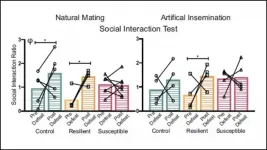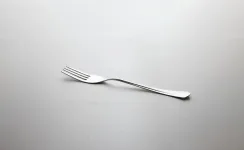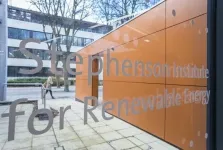(Press-News.org) Microgravity in space perturbs human physiology and is detrimental for astronaut health, a fact first realized during early Apollo missions when astronauts experienced inner ear disturbances, heart arrhythmia, low blood pressure, dehydration, and loss of calcium from their bones after their missions.
One of the most striking observations from Apollo missions was that just over half of astronauts became sick with colds or other infections within a week of returning to Earth. Some astronauts have even experienced re-activation of dormant viruses, such as the chickenpox virus. These findings stimulated studies on the effects of weak gravity, or "microgravity," on the immune system, which scientists have been exploring for decades of manned rockets launches, shuttle travel and space station stints, or sometimes by simulating space gravity in earthbound labs.
In the last study led by one of the first women astronauts, Millie Hughes-Fulford, PhD, researchers at UCSF and Stanford University now have shown that the weakening of an astronaut's immune system during space travel is likely due in part to abnormal activation of immune cells called T regulator cells (Tregs).
Tregs normally are triggered to ramp down immune responses when infection no longer threatens and are important regulators of immune responses in diseases ranging from cancer to COVID-19. In microgravity conditions, however, the researchers found changes in Tregs that prepared them to go to work even before the immune system was challenged. When they stimulated an immune response in human immune cells from blood samples in microgravity, with a chemical often used in research to mimic a disease pathogen, they found that Tregs helped suppress the immune response that was triggered. This unanticipated discovery is published online June 7 in the journal Nature Scientific Reports.
Hughes-Fulford became the first female payload specialist to orbit Earth with her experiments in 1991, and for decades, until her death due to leukemia in February, she studied the effects of microgravity on health, first with an emphasis on osteoporosis and later with a focus on the immune system. As a researcher at the San Francisco Veterans Affairs Medical Center and a UCSF faculty member long affiliated with the Department of Medicine, Hughes-Fulford mentored aspiring space scientists, including the co-principal investigators of this latest immunology study.
Jordan Spatz, PhD, a space scientist and UCSF medical student who became co-PI of the study after Hughes-Fulford's death, noted that as space travel becomes increasingly commercialized and more common, concerns over the health status of space travelers are likely to grow.
"Early in the space program, most astronauts were young and extremely healthy, but now they tend to have much more training and are older," Spatz said. "In addition, apart from astronauts, with the commercialization of space flight there will be many more older and less healthy individuals experiencing microgravity. From a space medical perspective, we see that microgravity does a lot of bad things to the human body, and we are hoping to gain the ability to mitigate some of the effects of microgravity during space travel."
The new study advanced earlier research led by Hughes-Fulford, confirming some of her previous findings from experiments in space and in simulated microgravity, while contributing additional molecular discoveries. Hughes-Fulford earlier had found weaker responses from T lymphocytes of the immune system, some of which attack specific pathogens directly and some of which help orchestrate the immune response.
"It's a double whammy," said co-PI Brice Gaudilliere, MD, PhD, an associate professor in the Department of Anesthesia at Stanford University School of Medicine. "There is a dampening of T lymphocyte immune activation responses, but also an exacerbation of immunosuppressive responses by Tregs." The researchers also found that "natural killer" lymphocytes were less active under simulated microgravity, while antibody-producing B cells appeared to be unaffected.
The researchers simulated microgravity in blood samples with a specialized, cylindrical, cell-culture vessel with motor-driven rotation, a long established microgravity research tool, but the method of single-cell analysis was unique. The scientists identified individual immune cells by specific type and used metal tags and mass spectroscopy to simultaneously detect and quantify dozens of proteins that play a role in immune function, in addition to confirming previously identified patterns of altered gene activation.
INFORMATION:
Funding: The study was funded by the UCSF Department of Biochemistry and Biophysics and the Stanford Department of Anesthesiology, Perioperative and Pain Medicine. No competing interests were declared.
About UCSF: The University of California, San Francisco (UCSF) is exclusively focused on the health sciences and is dedicated to promoting health worldwide through advanced biomedical research, graduate-level education in the life sciences and health professions, and excellence in patient care. UCSF Health, which serves as UCSF's primary academic medical center, includes top-ranked specialty hospitals and other clinical programs, and has affiliations throughout the Bay Area. UCSF School of Medicine also has a regional campus in Fresno. Learn more at ucsf.edu, or see our Fact Sheet.
Follow UCSF
ucsf.edu | Facebook.com/ucsf | YouTube.com/ucsf
A new study from researchers at Johns Hopkins Bloomberg School of Public Health and colleagues suggests a slowdown in the use of convalescent plasma to treat hospitalized COVID-19 patients led to a higher COVID-19 mortality during a critical period during this past winter's surge.
U.S. hospitals began treating COVID-19 patients with convalescent plasma therapy--which uses antibody-rich blood from recovered COVID-19 patients--in the summer of 2020 when doctors were looking to identify treatments for the emerging disease. By the spring of 2021, doctors in the United States had treated over 500,000 COVID-19 patients with convalescent plasma. The use ...
Male mice more susceptible to stress can pass down their behaviors to offspring via changes in their sperm's genetic code, according to new research published in JNeurosci.
Stressful experiences alter gene expression, which parents can pass down to their offspring. But it was unclear if sperm itself transmits this information, or if behavioral cues between the parents play a larger role.
Cunningham et al. tracked the stress response of male mice after ten days of chronic stress and sorted them into resilient and susceptible groups, based on the severity of their response. The offspring of resilient and control mice showed decreased stress behaviors ...
Researchers at the University of Sydney's Charles Perkins Centre conducted the largest ever study of nutrient interactions by examining the health of mice on 33 different diets containing various combinations of protein to carbs, and different sources of carbohydrate.
They found that a low-protein (10% of dietary energy), high-carbohydrate (70%) diet produced either the healthiest or unhealthiest metabolic outcomes of all 33 diets, depending on the kind of carbs.
When carbs were made up mainly of resistant starch, a form of starch that is resistant to digestion and is fermented by bacteria in the gut, the low protein diet was the healthiest of all diets. When the ...
A study examining gender bias and family-owned businesses found daughters were rarely encouraged nor received support to pursue entrepreneurship education while sons mostly did.
Professors James Combs, Peter Jaskiewicz, and Sabine Raul from the Telfer School of Management uncovered new insights about how gender bias - the preference of a gender over the other - affects the succession strategy in multi-generational family firms. Their findings are published in the Journal of Small Business Management.
When nurturing the next generation, entrepreneurial families often prepare their daughters and sons differently for their careers. The researchers noticed a common pattern in the stories shared by the next generation: Sons are often nurtured to ...
It's hard to see more than a handful of stars from Princeton University, because the lights from New York City, Princeton and Philadelphia prevent our sky from ever getting pitch black, but stargazers who get into more rural areas can see hundreds of naked-eye stars -- and a few smudgy objects, too.
The biggest smudge is the Milky Way itself, the billions of stars that make up our spiral galaxy, which we see edge-on. The smaller smudges don't mean that you need glasses, but that you're seeing tightly packed groups of stars. One of the best-known of these "clouds" or "clusters" -- groups of stars that travel together -- is the Pleiades, also known as the Seven Sisters. Clusters are stellar nurseries where thousands of stars are born from clouds of gas and dust and then ...
COLUMBUS, Ohio - Researchers have discovered a new electronic property at the frontier between the thermal and quantum sciences in a specially engineered metal alloy - and in the process identified a promising material for future devices that could turn heat on and off with the application of a magnetic "switch."
In this material, electrons, which have a mass in vacuum and in most other materials, move like massless photons or light - an unexpected behavior, but a phenomenon theoretically predicted to exist here. The alloy was engineered with the elements bismuth and antimony at precise ranges based ...
Carbon dioxide emissions in Los Angeles fell 33% in April of 2020 compared with previous years, as roads emptied and economic activity slowed due to the COVID-19 pandemic, according to a new study in Geophysical Research Letters. In the Washington, D.C./Baltimore region, emissions of carbon dioxide, or CO2, dropped by 34% during the same period.
The study was led by scientists at NASA's Jet Propulsion Laboratory (JPL), the National Institute of Standards and Technology (NIST) and the University of Notre Dame.
While the emissions reductions are significant, the method that scientists used to measure them may have the greater long-term impact.
In both locations, scientists had previously ...
Research between the University of Liverpool, UK and National Tsing Hua University (NTHU), Taiwan has revealed a new charge storage mechanism that has the potential to allow rechargeability within calcium-air batteries.
In a paper published in the journal Chemical Science, Professor Laurence Hardwick from the University of Liverpool's Stephenson Institute for Renewable Energy (SIRE) and colleagues discover a distinctive form of charge storage at the electrode interface described as trapped interfacial redox. This new finding introduces a new mechanism of charge storage that could be harnessed in practical devices.
Lead author of the paper, Yi Ting (Leo) Lu, is a joint PhD student in ...
A new study at the University of Chicago has determined that restoring a single microbial species -- Bacteroides sp. CL1-UC (Bc) -- to the gut microbiome at a key developmental timepoint can prevent antibiotic-induced colitis in a mouse model of the condition. The results, published on June 7 in END ...
TROY, N.Y. -- More strategic and coordinated travel restrictions likely could have reduced the spread of COVID-19 in the early stages of the pandemic. That's according to new research published in Communications Physics. This finding stems from new modeling conducted by a multidisciplinary team of scientists and engineers at Rensselaer Polytechnic Institute.
The researchers evaluated the distance between countries in terms of air travel, a more complex measurement than simply mapping physical distance. For instance, while China and Thailand may be geographically more proximate to one another, if there are significantly ...



